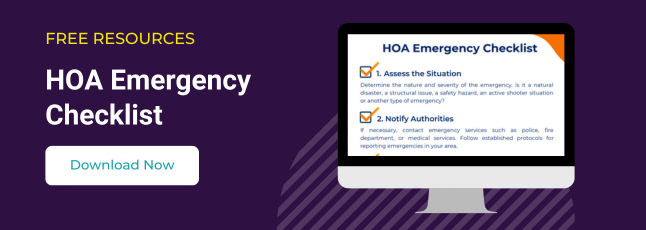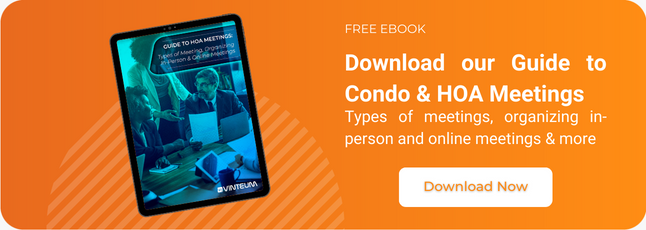There are times when unexpected things happen, and you’ve got to act fast to keep your community in good shape. That’s when calling for an HOA emergency board meeting comes into play as the first and most critical step.
In this blog post, we’re going to dive into the legal rules for HOA Emergency Board Meetings and share some practical tips that can make a real impact.
Our aim is to give you the knowledge and tools you need to be well-prepared and effective during these sudden meetings.
What is an HOA board emergency meeting?
An HOA emergency board meeting may be called when something unexpected comes up that requires the board’s immediate attention and action, making it hard to give the usual meeting notice.
The rules regarding HOA emergency board meetings can vary based on the state you live in and your governing documents. If you have any doubts, be sure to verify the applicable regulations or consult with an HOA attorney.
What circumstances allow the board to conduct an emergency meeting?
The explanation given by the Civ. Code § 4923 is:
if there are circumstances that could not have been reasonably foreseen which require immediate attention and possible action by the board, and which of necessity make it impracticable to provide notice. Such a meeting can be called by the board president, or by any two board members other than the president.
A great example of this is a natural disaster. Natural disasters are often challenging to predict, and even when you know they’re coming they’re tough. They can inflict significant damage, requiring prompt decision-making and action.
If you are unsure whether to call a meeting or not, here’s what you can do:
First, ask if the situation can wait for the regular notice. Second, consider whether the community and its members will face significant harm if the board doesn’t take action within the next 48 hours. If not, there may be no need for an emergency meeting.
In what formats can the meeting take place?
An emergency meeting can usually take place in three different formats. Again, it will depend on your state law and governing documents.
- In-person – The board of directors may meet in person at a physical location.
- Teleconference – The board of directors may meet via conference call through audio or video or both.
- Email – emergency meetings are the only type of board meeting that may be conducted via “a series of electronic transmissions”. To hold an emergency meeting via email, all directors must consent in writing.
How do notices, agendas, and minutes work in HOA emergency board meetings
Emergency meetings aren’t scheduled in advance and need to happen quickly, due to circumstances. That means they don’t typically require prior notice, unlike regular HOA meetings. Depending on your HOA’s rules, you may need to let residents know about an emergency meeting taking place.
An emergency meeting is normally held to discuss one important issue, so agendas aren’t always needed. Nevertheless, it’s still essential to keep meeting minutes of the HOA meeting and share them afterward.
Best practices for successful HOA Emergency Board Meetings
Having a meeting without prior notice or preparation can be quite challenging. In such situations, it is crucial to maintain objectivity, be clear and efficient, and treat all participants with respect.
Handling emergencies can be stressful, and guiding the group through a crisis can be demanding, so it’s essential to demonstrate empathy and kindness.
To ensure that your HOA Emergency Board Meetings run smoothly and effectively, follow these best practices:
Clear Communication: Keep communication clear and concise during the meeting to ensure everyone is on the same page. Actively listen to all participants.
Transparency and Collaboration: Prioritize transparency in your decision-making process. Involve as many board members as possible to reduce the likelihood of misunderstandings and conflicts.
Positive & Problem-Solving Mindset: Encourage positive contributions and solutions. Recognize and appreciate the efforts of board members who are actively working towards a resolution. This can motivate a more collaborative atmosphere.
Generating Alternatives: Inspire board members to brainstorm various potential solutions to the problem. Embrace all suggestions, including unconventional ones, as emergency situations often demand creative thinking.
Evaluating Alternatives: Assess the proposed solutions, considering their advantages and disadvantages. Encourage an objective evaluation process and consensus-building.
Empathy: Recognize that emergency situations can be stressful, and participants may be dealing with heightened emotions. Show empathy by understanding their perspectives and demonstrating that you appreciate their input and presence.

Wrapping up on HOA emergency board meetings
Knowing the rules and best practices for HOA Emergency Board Meetings is crucial for every board member. By following the necessary rules, and being well-prepared, you make sure your community is in good hands. So, when the going gets tough, you’ll be there to steer the ship and keep your community on the right track. So, when the need for an HOA emergency board meeting arises, you’ll be well-prepared and confident in your actions.




